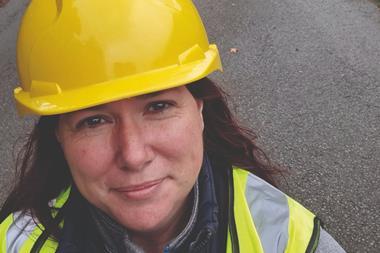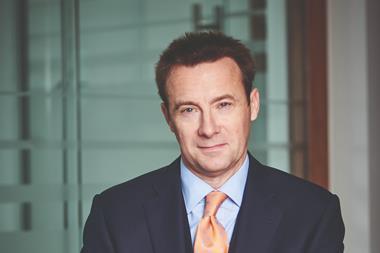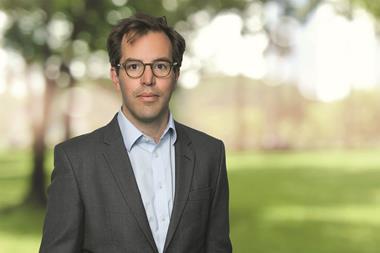Having acquired Harwell in 2020 and Arlington in 2021, Brookfield is building a Europe-wide network of innovation clusters catering to emerging technologies in life sciences, energy, quantum computing and space. With decades of experience leading Blackstone’s global expansion, ARC boss Stuart Grant joins Andrew Teacher with Dr Barbara Ghinelli, chief scientific advisor at ARC and director of innovation at UKRI-STFC to explain why there’s no limit to the group’s ambitions.
You can listen to this podcast via Apple Podcasts or Spotify or SoundCloud or listen to it through the player below:
Unassuming, humble and relaxed, Stuart Grant belies the stereotypes most British media would have you believe about private equity execs. But make no mistake, while Grant has achieved more than most do in an entire career, his hunger for success is fierce and his bold vision for ARC – Advanced Research Clusters has helped it deliver 30 million sq ft of science-ready space inside two years across four clusters in Oxford, Uxbridge, west London and Harwell.
Grant worked as a senior managing director at Blackstone, with a two-decade stint in Hong Kong focussing on the Asia-Pacific region – where he oversaw more than $20 billion worth of investments in Greater China, India, Singapore, Japan, Korea and Australia. He saw the potential for life sciences as a major real estate megatrend and, on returning to Britain, teamed up with their rivals Brookfield to develop a continent-wide platform that could work with scientists, governments and innovators of all shapes to build and operate campuses that literally shape the future.
He cites BioMed Realty, the REIT which Blackstone took private in 2016 and then successfully refinanced in 2020 as a big inspiration, and he believes that success in this area requires genuine global networks and a deep knowledge of the sector.
“We’ve learnt a lot since we’ve got involved at Harwell,” he admits recalling the firm’s first and most famous asset. “Working Government agencies can leave some private investors nervous - but the opposite is true of us. We’ve embraced it and they’ve embraced us,” he says, referencing the various public bodies involved with the Harwell Science and Innovation Campus in Oxfordshire, such as the Faraday Institution, the National Quantum Computing Centre and the UK Health Security Agency.
While the life sciences have seen a run of capital flowing in across Britain, Grant is unfazed by the competition and firmly believes that this is one area where knowledge is power. “The people we’re meeting are space companies, leading life sciences firms and cleantech or quantum computing companies – these are very clever scientists. Their requirements are different and you need to dig deep into their specific requirements with scientific knowledge to deliver what they require.”
Dr Barbara Ghinelli, chief scientific advisor at ARC and business development director at the Harwell Campus, is a former electronic engineer, she previously worked for the 3.2 bn euro Copernicus project which uses satellites to monitor the environment and security on Earth. Her expertise has attracted positions as board member at the Rosalind Franklin Institute, which works on interdisciplinary life sciences research.
ARC was created by Brookfield, a leading global investor with $690billion in assets under management, including over $250billion of real estate assets, and is now backed by a raft of major global investors. It collaborates with universities, government agencies and the private sector to create large-scale ‘communities’ that foster innovation.
“When we talk to organisations to bring them to Harwell,” says Grant, “we also have one of the biggest real estate investors behind us, and that makes a big difference. Our business plan is based on fast, speculative development.
“We have commitments around the sector and tenant demand remains really strong ‘ but supply remains tight. We can still develop an attractive yield on cost that encourages us to build more.”
“Harwell was the launchpad for the ARC brand,” Grant explains. “It’s a privilege to collaborate with great partners and to own a stake in the UK’s leading science and technology campus. But the plan was always to see if we can do more.”
And that’s precisely what they have done.
Through the acquisition of Arlington for £714million in the group acquired Oxford Business Park, Uxbridge Business Park, and a site in Hammersmith now known as ARC West London. “That’s when we rebranded to ARC,” he continues, impressing the point that “all of this has happened within the first twelve months of ownership”.
ARC’s mission is to create high quality managed environments for businesses involved in science and technology research and development. By creating these large-scale clusters of like-minded companies, ARC has grown to encompass 300 science and technology businesses and organisations – including Oxford Space Systems, Astroscale, Perspectum and Oxford BioMedica – who together employ over 10,000 people. By the late 2020s Brookfield is set to invest over £1 billion in Oxfordshire across the ARC Oxford and Harwell Campuses.
“What we see at Harwell is cross-collaboration between clusters,” Grant explains. “The space cluster will work with the energy cluster - and vice versa. At Harwell we have one the first autonomous vehicles using 5G technology as an experiment due to this collaboration, between the Space Agency and a private business, Telefonica.”
While life sciences have hogged the limelight, Britain’s space sector is just as vital for Harwell. Today, the Harwell Space Cluster forms an integral part of the UK’s space sector and has grown into a dynamic, enterprising ecosystem of 105 space organisations employing over 1,400 people. The sector contributes £5.7bn to the country’s GDP.
Harwell Campus, just south of Oxford, has bespoke clusters for Energy, Space, Health and Quantum Computing, and is home to over 6000 employees across over 200 organisations on site, with £3bn of scientific infrastructure across 700 acres. Harwell now includes 16 unique scientific national facilities – representing £3billion of UK government investment.
The Harwell Campus has a rich history as a pioneering institution. It began with the first Medical Research Council laboratory in 1945 and the Atomic Energy Research Establishment on the site of RAF Harwell. Since then, the Campus has grown to encompass many world firsts and research breakthroughs. The campus has been home to the Diamond Light Source Synchrotron since 2007 - a giant electron microscope that permits advances in fields as diverse as fossil fuels, jet engines, viruses and vaccines, helping to keep the UK at the forefront of scientific research.
Harwell Campus is also pushing frontiers as a major pillar of the UK space sector: over 100 space organisations are based at the Campus, including RAL Space, Satellite Applications Catapult, Astroscale and both the European Space and UK Space Agencies.
Ghinelli says innovation clusters need to be thought of as “fundamentally a collaborative approach between industry, academia, and public sector organisations”, and that supporting cross-fertilisation between space tech, life science, and energy tech can lead to exciting results. Described as a ‘megatrend’, Grant sees life sciences driving long-term growth across many regional economies – both in Britain and across Europe.
As a result, the life sciences sector will remain an attractive investment opportunity, in spite of any short term dips in the public markets or VC funding. “Science doesn’t stop,” Grant says robustly. “Innovation continues to advance – it’s a mega trend. If you go through the line-up of organisations bidding for lab space, it’s as healthy as it was six months ago. It’s at a record level compared to three or four years ago. But this is about far more than just labs. We’re only just getting started.”
You can listen to this podcast via Apple Podcasts or Spotify or SoundCloud or listen to it through the player above.
































No comments yet